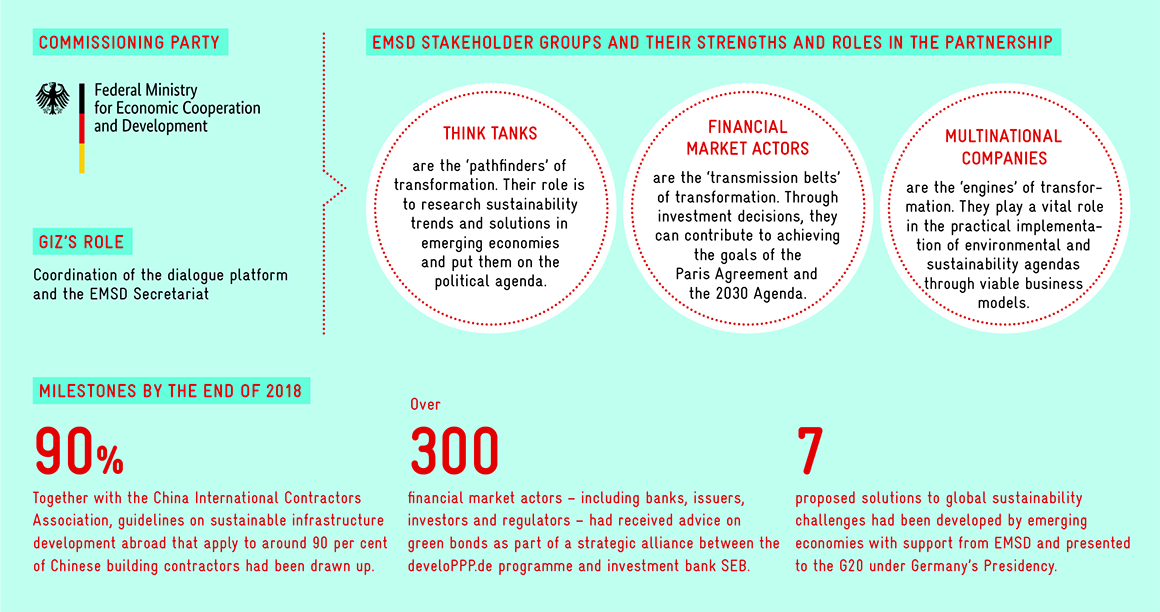STrong
PARTNER-
SHIPS
–
Because the complex issues of the future cannot be addressed alone, the goals of the 2030 Agenda can only be achieved with the support of others. As such, cooperation is a basic principle of our work. The goal we set ourselves is to be a good partner for others.
Entering into partnerships, shaping them in a flexible way and bringing them to a successful conclusion is a challenging task. We want to keep improving the way in which we jointly build our partnerships on an equal footing.
WHAT WE ARE DOING TO BE A GOOD PARTNER
- We are improving our partnership management as a core competence of the company.
- We are strengthening our contact structure and increasing staff expertise in the area of partnerships.
- We are creating more coherence for our partners by defining interfaces and processes.
Together with many others, we are continuing to expand our global partnerships. Conceptual approaches are reaching their limits, particularly in a world that is uncertain and increasingly complex. More and more often, cooperation is therefore taking the form of ʻco-creation’: joint learning and the development of innovative solutions in project work, networks and initiatives enhance the impact of measures. Through partnerships with German institutions and companies, GIZ also wants to help mobilise German expertise and channel it for international cooperation.
MANAGING CHALLENGES
Coordinating partnerships, however, is a demanding task. Conflicts of interest or objectives are common in development cooperation, and compromises must be negotiated. It is not always easy to build a partnership on an equal footing. Sometimes, for example, a partner might think that tasks or the resources used have not been distributed fairly.
THE DIVERSE NATURE OF OUR COOPERATION
Specialist German institutions, other bilateral and multilateral development organisations, international and local non-governmental organisations, companies, associations, foundations, and the academic and scientific communities – global challenges can only be addressed by working with a variety of actors. We engage in various forms of cooperation and – in line with the 2030 Agenda – place particular emphasis on multi-stakeholder partnerships, i.e. partnerships of actors from the public sector, private sector, scientific and academic communities and civil society. On behalf of BMZ, GIZ provides practical advice to facilitate efficient cooperation processes in new and existing multi-stakeholder partnerships.
PRIVATE SECTOR PARTNERS ARE BECOMING MORE IMPORTANT
Partnerships with the private sector are already an essential part of development cooperation. Together with companies and industry associations, we are committed to building sustainable supply chains and production processes. This makes a long-term improvement to living conditions in countries of origin.
TOGETHER WE THRIVE
When it comes to successfully building partnerships, the following factors have proven effective for us:
- Complementarity of partners: maximum impact can be achieved when all sides bring to the table clearly defined and recognisable strengths.
- Clear articulation of mutual interests and joint benefits.
- Clarity from start to finish: from identifying worthwhile partnerships, and operational cooperation, to possible separation in the event of irreconcilable conflicts of interest.
- Good organisation, with clearly defined structures, processes and contacts.
COOPERATION IS ESSENTIAL FOR OUR WORK
GIZ has therefore anchored cooperation with others in its Corporate Strategy: we can only deliver on our performance commitments if we continue to focus on pooling the necessary expertise, such as specialist skills and access to various networks.
AN EXAMPLE FROM THE FIELD: Promoting sustainable economic development in emerging economies
In light of their growing influence on global transformation processes, emerging economies are increasingly being called upon to help shape joint rules and standards on a sustainable basis. This works best by taking a partnership approach. On behalf of BMZ, GIZ therefore coordinates the dialogue platform Emerging Market Sustainability Dialogues (EMSD), which supports think tanks, financial market actors and multinational companies from industrialised countries and emerging economies in developing joint solutions for sustainable economic development.
Specifically, for example, the strategic alliance with the Swedish investment bank SEB has helped to improve technical knowledge of green bonds at key institutions in Brazil, China, India and Mexico. In addition, a longstanding partnership with the China International Contractors Association (CHINCA) served as the basis for the development of sustainability guidelines for Chinese construction companies in international infrastructure projects.
